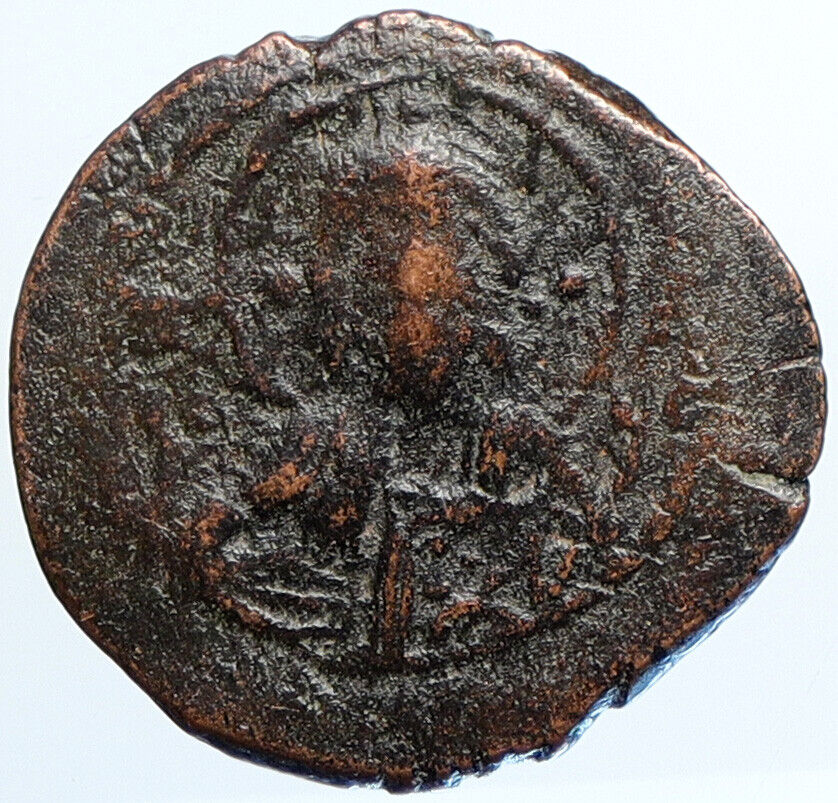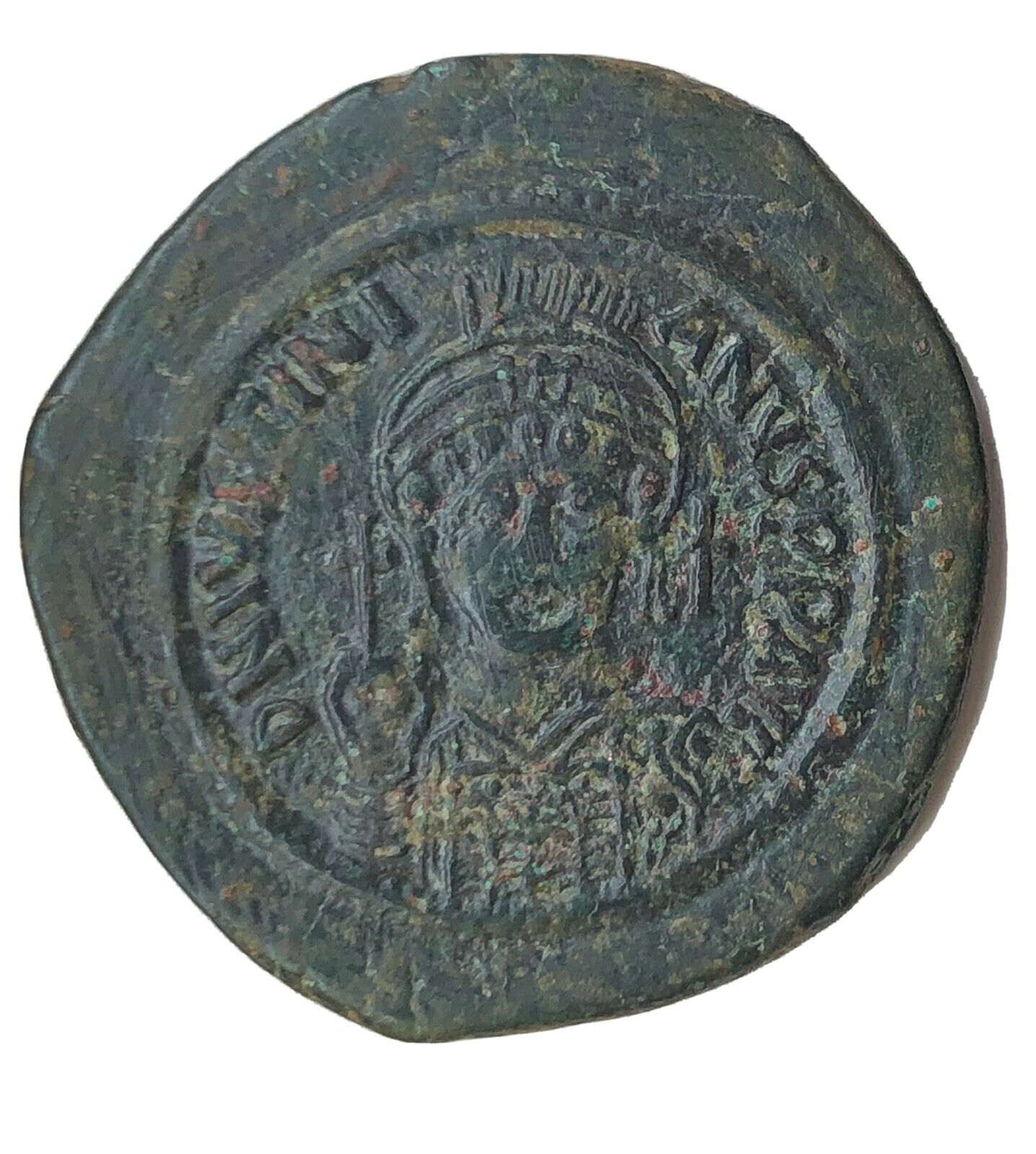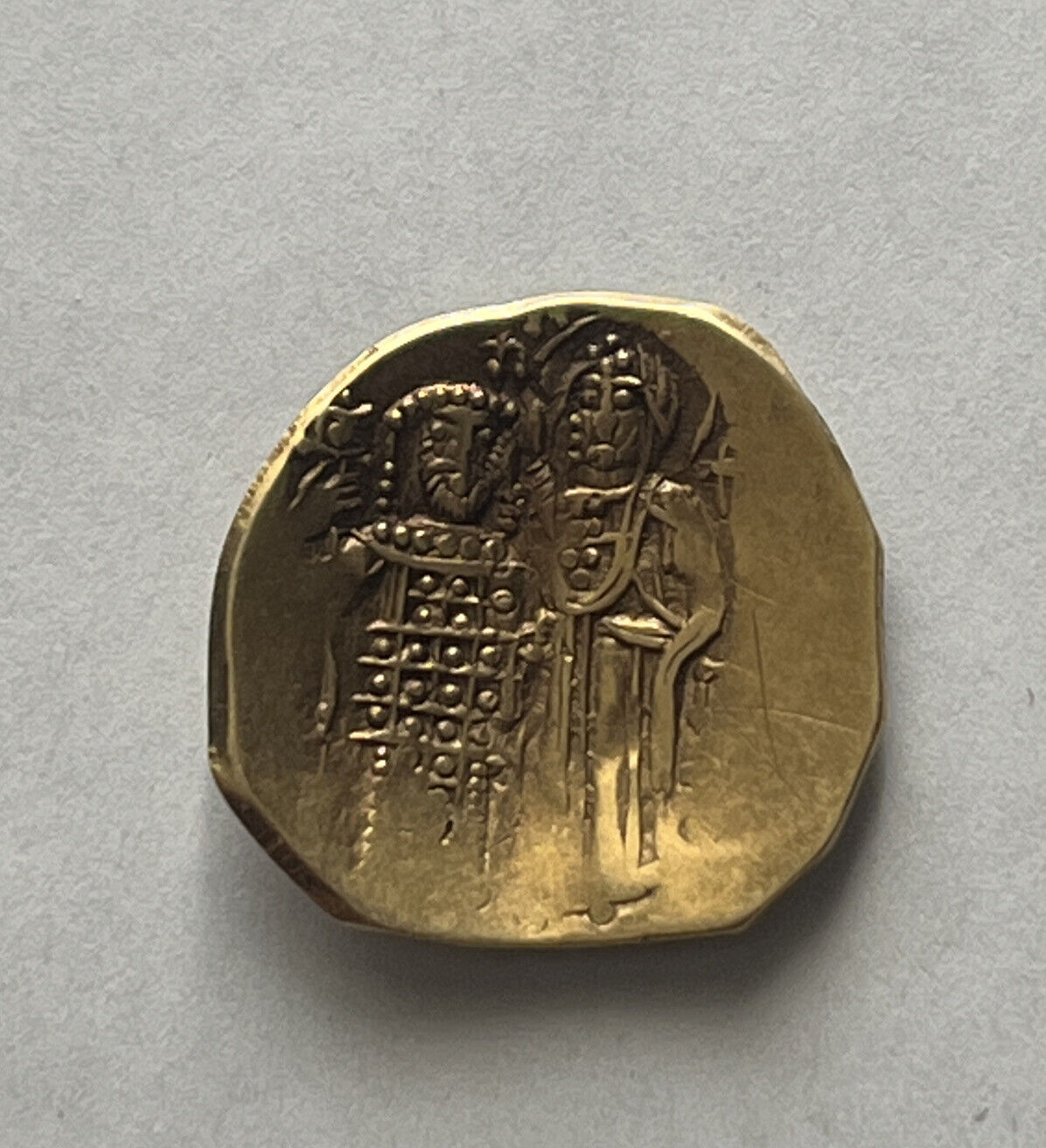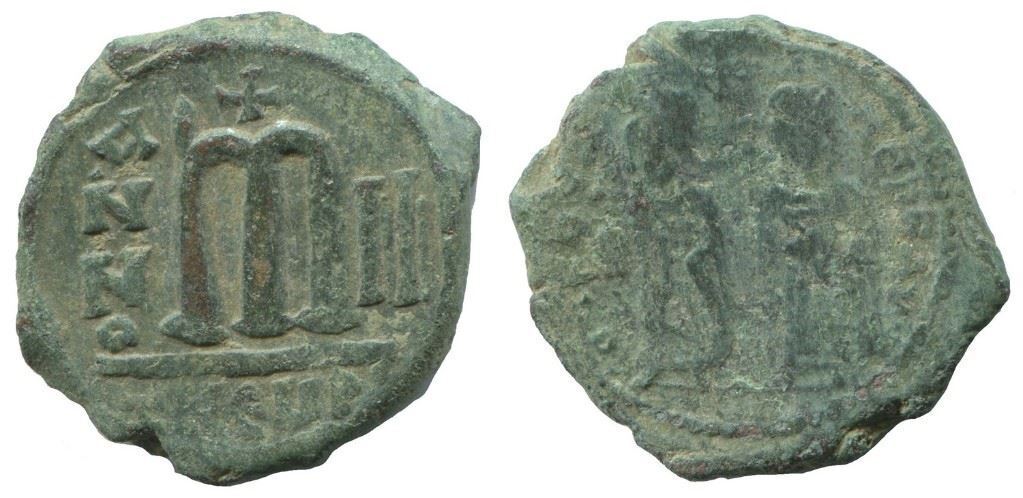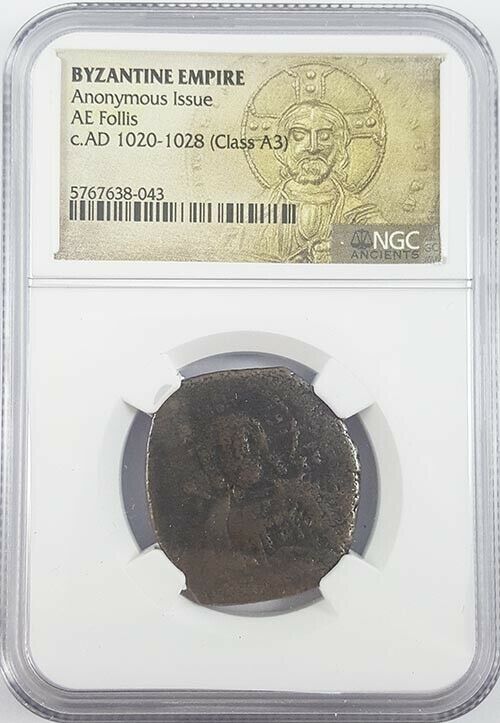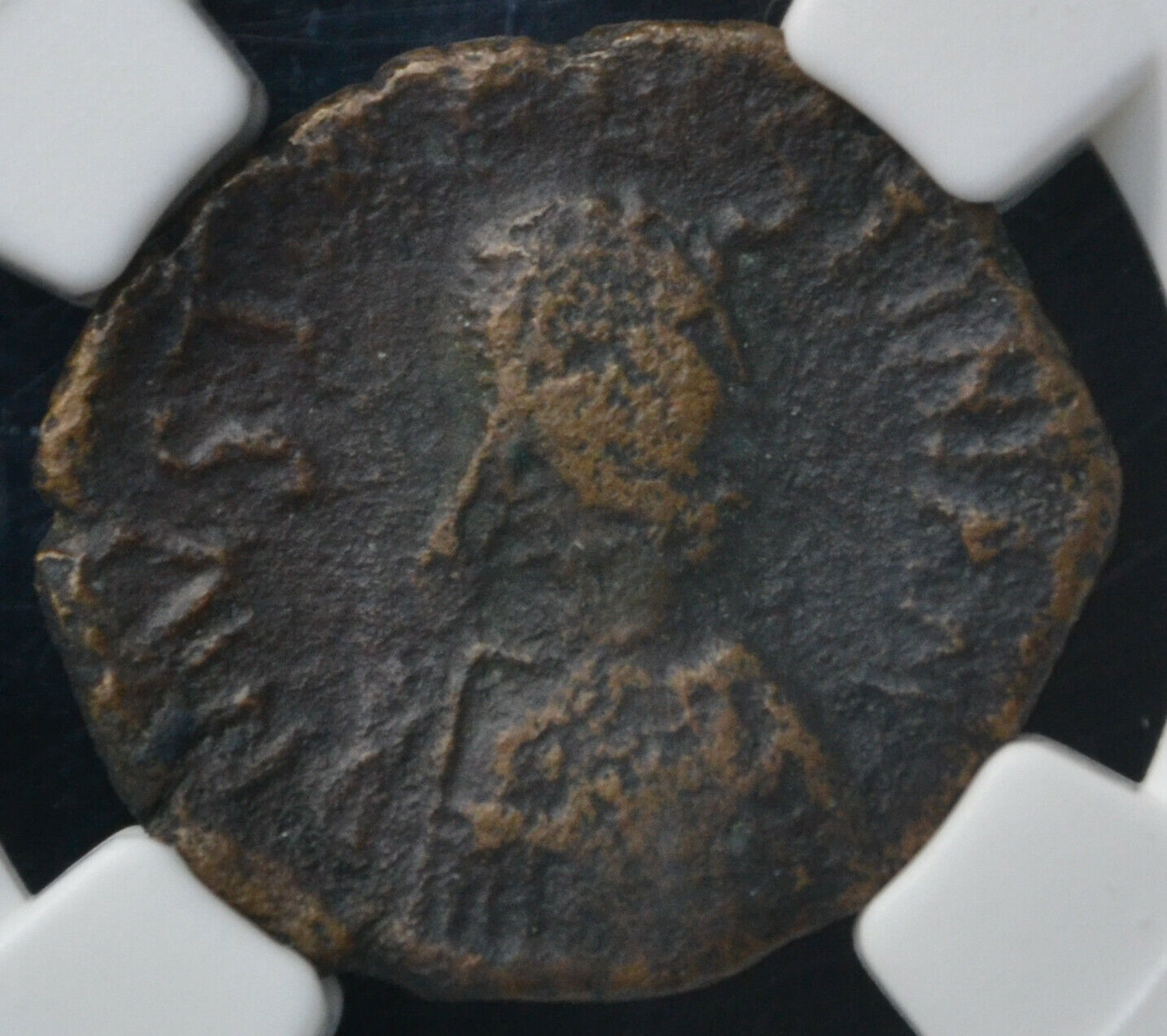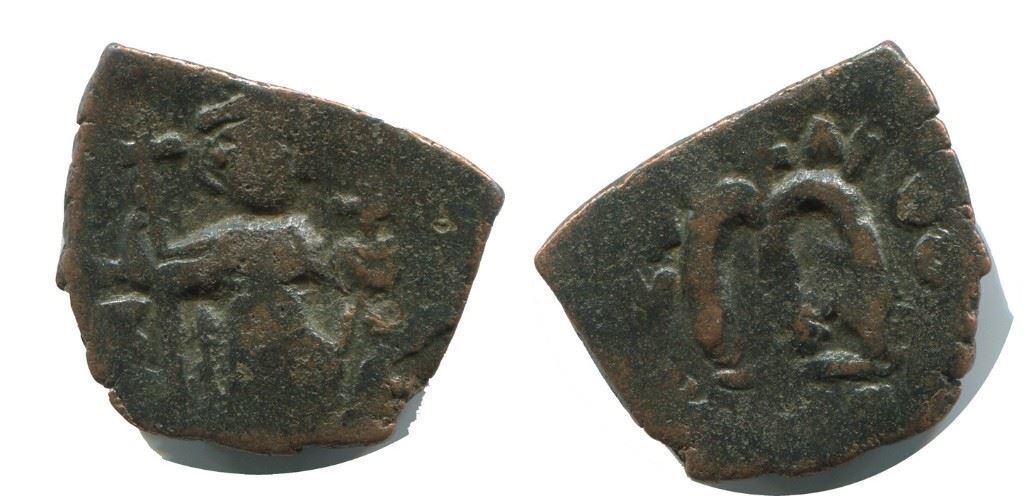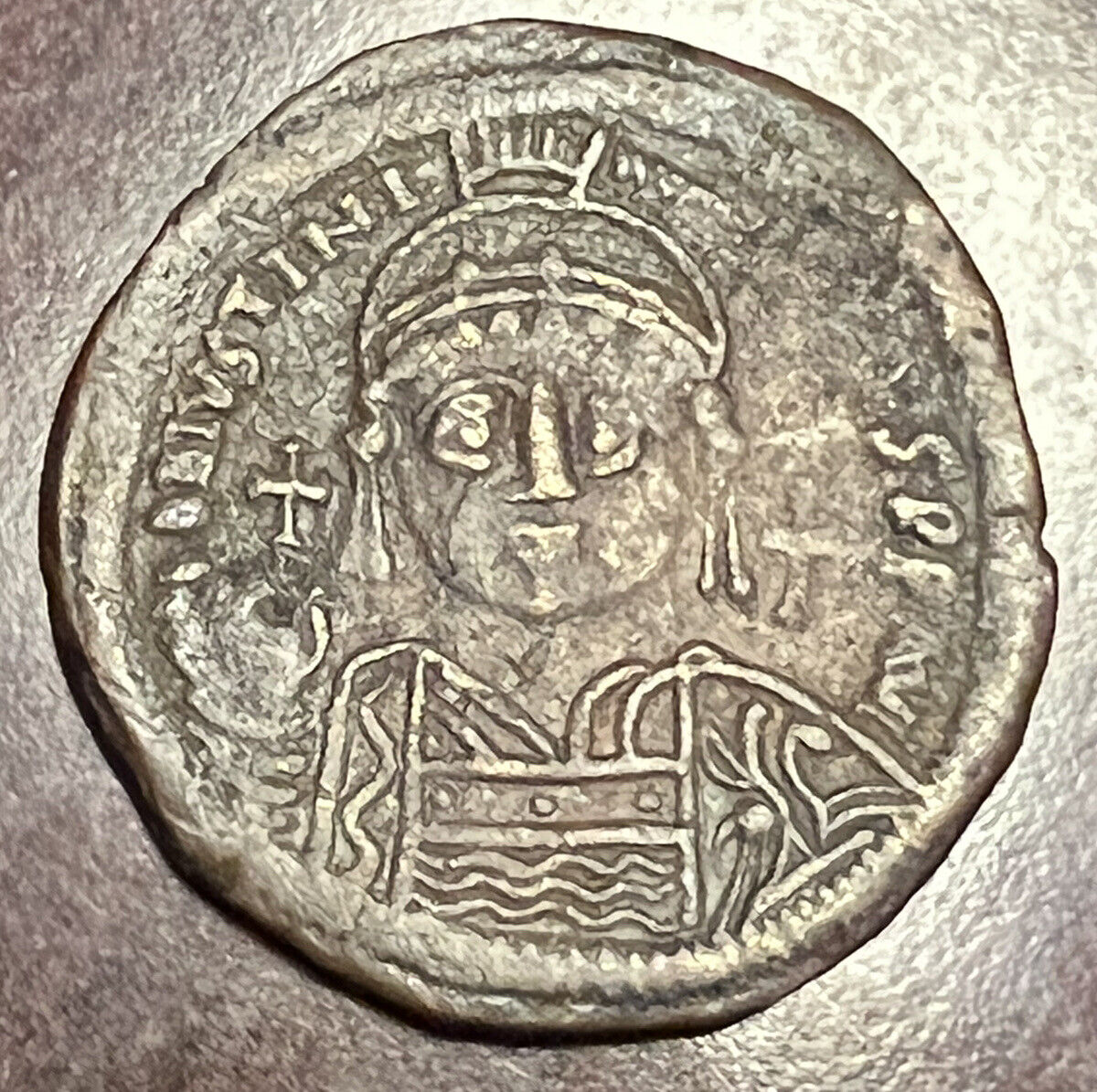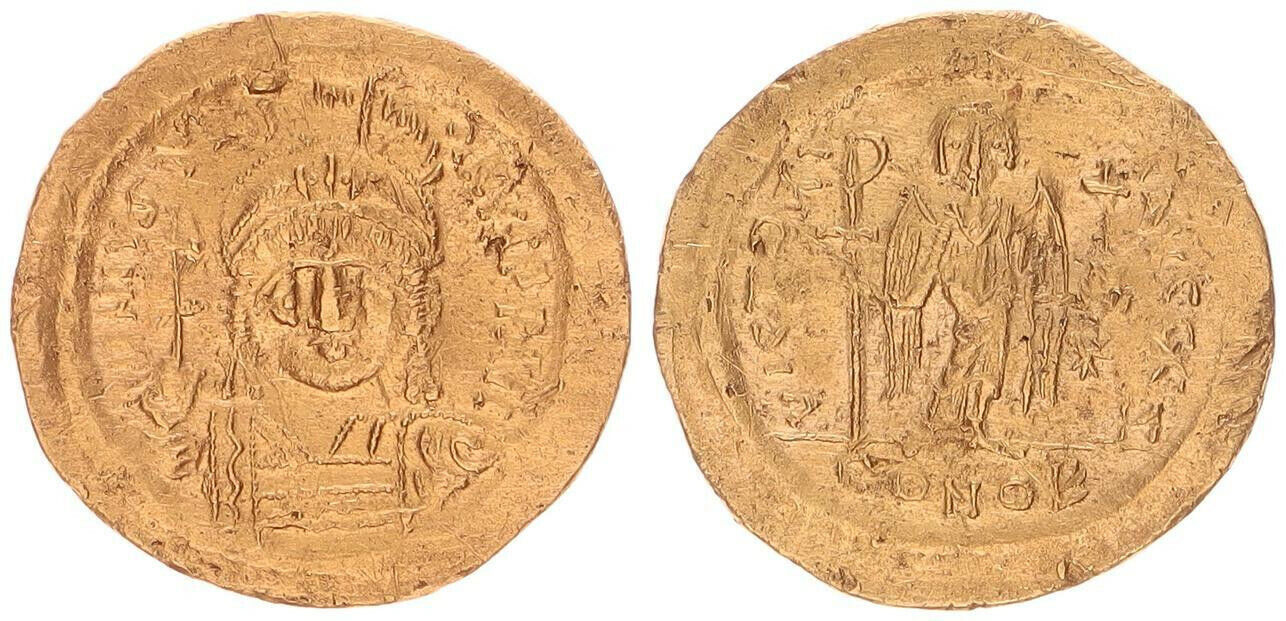-40%
JESUS CHRIST Class I Anonymous Ancient OLD Byzantine Follis Coin CROSS i110123
$ 263.2
- Description
- Size Guide
Description
Item:i110123
Authentic Ancient Coin of:
Byzantine Empire
-
Anonymous Class I
Bronze Follis 26mm (6.26 grams)
Struck during the reign of Nicephorus III - 24 March 1078 - 4 April 1081 A.D.
Reference: Sear 1889
Bust of
Jesus Christ
facing, wearing nimbus crown, pallium and colobium, and raising right hand in benediction, in left hand, the book of Gospels, IC to left, XC to right; within border.
Latin
cross
, with X at center, and globule and two pellets at each extremity; in lower field, on either side, floral ornament; in upper field, on either side, crescent.
For more than a century, the production of Follis denomination Byzantine coins had religious Christian motifs which included included Jesus Christ, and even Virgin Mary. These coins were designed to honor Christ and recognize the subservient role of the Byzantine emperor, with many of the reverse inscriptions translating to "Jesus Christ King of Kings" and "May Jesus Christ Conquer". The Follis denomination coins were the largest bronze denomination coins issued by the Byzantine empire, and their large size, along with the Christian motif make them a popular coin type for collectors. This series ran from the period of Byzantine emperors John I (969-976 A.D.) to Alexius I (1081-1118 A.D.). The accepted classification was originally devised by Miss Margaret Thompson with her study of these types of coins. World famous numismatic author, David R. Sear adopted this classification system for his book entitled, Byzantine Coins and Their Values. The references about this coin site Mr. Sear's book by the number that they appear in that work. The class types of coins included
Class A1
,
Class A2
,
Class A3
,
Class B
,
Class C
,
Class D
,
Class E
,
Class F
,
Class G
,
Class H
,
Class I
,
Class J
,
Class K
.
Read the
JESUS CHRIST Anonymous
Class A-N Byzantine Follis Coins Reference and Guide
S
ee
ALL
the Jesus Christ
Anonymous Follis coins
for sale.
See
ALL
coins bearing
Jesus Christ or related
available for sale.
You are bidding on the exact item pictured, provided with a Certificate of Authenticity and Lifetime Guarantee of Authenticity.
Jesus
(7-2 BC to AD 30-33), also referred to as Jesus of Nazareth or Jesus Christ, is the central figure of Christianity, whom the teachings of most Christian denominations hold to be the Son of God. Christians believe Jesus is the awaited Messiah (or Christ, the Anointed One) of the Old Testament.
Virtually all modern scholars of antiquity agree that Jesus existed historically, and historians consider the Synoptic Gospels (Matthew, Mark and Luke) to be the best sources for investigating the historical Jesus. Most scholars agree that Jesus was a Galilean, Jewish rabbi who preached his message orally, was baptized by John the Baptist, and was crucified by the order of the Roman Prefect Pontius Pilate. In the current mainstream view, Jesus was an apocalyptic preacher and the founder of a renewal movement within Judaism, although some prominent scholars argue that he was not apocalyptic. After Jesus' death, his followers believed he was resurrected, and the community they formed eventually became the Christian church. The widely used calendar era, abbreviated as "AD" from the Latin "Anno Domini" ("in the year of our Lord") or sometimes as "CE", is based on the birth of Jesus.
Christians believe that Jesus has a "unique significance" in the world. Christian doctrines include the beliefs that Jesus was conceived by the Holy Spirit, was born of a virgin named Mary, performed miracles, founded the Church, died by crucifixion as a sacrifice to achieve atonement, rose from the dead, and ascended into Heaven, whence he will return. Most Christians believe Jesus enables humans to be reconciled to God, and will judge the dead either before or after their bodily resurrection, an event tied to the Second Coming of Jesus in Christian eschatology; though some believe Jesus's role as savior has more existential or societal concerns than the afterlife, and a few notable theologians have suggested that Jesus will bring about a universal reconciliation. The great majority of Christians worship Jesus as the incarnation of God the Son, the second of three persons of a Divine Trinity. A few Christian groups reject Trinitarianism, wholly or partly, as non-scriptural.
In Islam, Jesus (commonly transliterated as Isa) is considered one of God's important prophets and the Messiah, second in importance only to Muhammad. To Muslims, Jesus was a bringer of scripture and was born of a virgin, but was not the Son of God. According to the Quran, Jesus was not crucified but was physically raised into Heaven by God. Judaism rejects the belief that Jesus was the awaited Messiah, arguing that he did not fulfill the Messianic prophecies in the Tanakh.
Nikephoros III Botaneiates
, Latinized as
Nicephorus III Botaniates
(Greek: Νικηφόρος Βοτανειάτης, c. 1002 - 10 December 1081) was Byzantine emperor from 1078 to 1081. He belonged to a family which claimed descent from the Byzantine Phokas family.
Early career
Nikephoros Botaneiates had served as general from the reign of Constantine IX. Drawn to politics, he had been an active participant in the uprising that brought Isaac I to the throne in 1057, including a prominent role in the Battle of Petroe. Although considered a competent general, he had suffered a number of humiliating setbacks throughout his career. In 1064, he, together with Basil Apokapes, doux of Paradounavon, defended the Balkan frontiers against the invading Oghuz Turks, but was defeated and suffered the humiliation of being taken captive. However, the outbreak of an epidemic soon began decimating the Turks and the prisoners were recovered, while the survivors were quickly recruited in the Byzantine army.
In 1067, he had been considered as a possible husband for the empress Eudokia Makrembolitissa, widowed wife of Constantine X, but she eventually set her heart on Romanos IV Diogenes. Excluded from Romanos's campaign at Manzikert, he retired to his estates in Anatolia. Eventually, under Michael VII Doukas, he became strategos of the Anatolic theme and commander of the troops in Asia Minor. Here he participated in the shambolic acts that crippled the empire's eastern provinces, including his strategic retreat when Caesar John Doukas was confronting Norman mercenary rebels, resulting in the humiliating defeat of the Byzantine army, and the capture of John Doukas.
In 1078 he revolted against Michael VII and his finance minister Nikephoritzes, and with the support of the Seljuk Turks who provided him with valuable troops he marched upon Nicaea, where he proclaimed himself emperor. In the face of another rebellious general, Nikephoros Bryennios, his election was ratified by the aristocracy and clergy, while Michael VII abdicated and became a monk. On 24 March 1078, Nikephoros III Botaneiates entered Constantinople in triumph and was crowned by Patriarch Kosmas I of Constantinople. With the help of his general Alexios Komnenos, he defeated Bryennios and other rivals, but failed to clear the invading Turks out of Asia Minor.
Reign
To solidify his position, on the death of his second wife Nikephoros III sought to marry Eudokia Makrembolitissa, the mother of Michael VII and the widow of Constantine X and Romanos IV. This plan was undermined by the
Caesar
John Doukas, and Nikephoros instead married Maria of Alania. They married in contravention of church canons, as Maria was still at that time, the wife of Michael VII who had entered the monastery of Stoudios. Nevertheless, Nikephoros did not recognize the succession rights of Maria's son Constantine Doukas, while his plan to promote his worthless nephew Synadenos as co-emperor exposed him to the suspicion and plots of the surviving portions of the Doukas faction at court. Nikephoros' administration did not win him much support, as his favored courtiers alienated much of the older court bureaucracy and failed to stop the devaluation of the Byzantine currency.
Almost immediately, the uprisings began. Apart from the discontent of the Byzantine aristocracy, several Armenian princes in Asia Minor attempted to establish their independence from the empire. Two Paulician leaders launched their own rebellion in Thrace, in a brutal religious conflict that was not easily suppressed. Consequently, Nikephoros became increasingly dependent on the support of Alexios Komnenos, who successfully defeated the rebellion of Nikephoros Basilakes in the Balkans (1079) and was charged with containing that of Nikephoros Melissenos in Anatolia (1080). The Byzantine Empire also faced foreign invasion, as the Norman Duke Robert Guiscard of Apulia declared war under the pretext of defending the rights of young Constantine Doukas, who had been engaged to Robert's daughter Helena. As Alexios was entrusted with substantial armed forces to combat the impending Norman invasion, the Doukas faction, led by the Caesar John, conspired to overthrow Nikephoros and replace him with Alexios. Failing to secure the support of either the Seljuk Turks or Nikephoros Melissenos (both parties being his traditional enemies), Nikephoros III was forced to abdicate in favour of the Komnenos dynasty, to which he was connected through the engagement of his grandson to the daughter of Alexios's older brother Manuel. The deposed emperor retired into the monastery that he had endowed and died later the same year.
Nikephoros III in fiction
Nicephorus III
is also a fictional Byzantine Emperor ruling in the beginning of the 14th century in Harry Turtledove's alternate history novel
Agent of Byzantium
.
Frequently Asked Questions
Mr. Ilya Zlobin
, world-renowned expert numismatist, enthusiast, author and dealer in authentic ancient Greek, ancient Roman, ancient Byzantine, world coins & more.
Who am I dealing with?
You are dealing with Ilya Zlobin, ancient coin expert, enthusiast, author and dealer with an online store having a selection of over 15,000 items with great positive feedback from verified buyers and over 10 years experience dealing with over 57,000 ancient and world coins and artifacts. Ilya Zlobin is an independent individual who has a passion for coin collecting, research and understanding the importance of the historical context and significance all coins and objects represent. Most others are only concerned with selling you, Ilya Zlobin is most interested in educating you on the subject, and providing the largest selection, most professional presentation and service for the best long-term value for collectors worldwide creating returning patrons sharing in the passion of ancient and world coin collecting for a lifetime.
How long until my order is shipped?
Orders are shipped by the next business day (after receipt of payment) most of the time.
How will I know when the order was shipped?
After your order has shipped, you will be left positive feedback, and that date could be used as a basis of estimating an arrival date. Any tracking number would be found under your 'Purchase history' tab.
USPS First Class mail takes about 3-5 business days to arrive in the U.S. International shipping times cannot be estimated as they vary from country to country.
Standard international mail to many countries
does not
include a tracking number, and can also be slow sometimes.
For a tracking number and signature confirmation, you may want to do Express Mail International Shipping, which costs more, however, is the fastest and most secure. Additionally you may be able to receive your order in as little as 3-5 business days using this method. For Express Mail International, it may be possible to place up to 10-15 items in one package (for the one shipping cost) as it is flat rate envelope, which may be the most cost-effective, secure and fastest way to receive items internationally. Send me a message about this and I can update your invoice should you want this method.
Getting your order to you, quickly and securely is a top priority and is taken seriously here.
Great care is taken in packaging and mailing every item securely and quickly.
Please be aware, I cannot take responsibility for any postal service delivery delays, especially for international packages as it may happen in rare instances.
What is a certificate of authenticity and what guarantees do you give that the item is authentic?
Each of the items sold here, is provided with a Certificate of Authenticity, and a Lifetime Guarantee of Authenticity, issued by a world-renowned numismatic and antique expert that has identified over 57,000 ancient coins and has provided them with the same guarantee. You will be very happy with what you get with the COA; a professional presentation of the coin, with all of the relevant information and a picture of the coin you saw in the listing. Additionally, the coin is inside it's own protective coin flip (holder), with a 2x2 inch description of the coin matching the individual number on the COA.
On the free-market such a presentation alone, can be considered a - value all in itself, and it comes standard with your purchases from me,
FREE.
With every purchase, you are leveraging my many years of experience to get a more complete context and understanding of the piece of history you are getting. Whether your goal is to collect or give the item as a gift, coins presented like this could be more prized and valued higher than items that were not given such care and attention to.
Buy a coin today and own a piece of history, guaranteed.
Is there a money back guarantee?
I offer a 30 day unconditional money back guarantee. I stand behind my coins and would be willing to exchange your order for either store credit towards other coins, or refund, minus shipping expenses, within 30 days from the receipt of your order. My goal is to have the returning customers for a lifetime, and I am so sure in my coins, their authenticity, numismatic value and beauty, I can offer such a guarantee.
When should I leave feedback?
Once you receive your order, please leave a positive feedback. Please don't leave any negative feedbacks, as it happens sometimes that people rush to leave feedback before letting sufficient time for their order to arrive. Also, if you sent an email, make sure to check for my reply in your messages before claiming that you didn't receive a response. The matter of fact is that any issues can be resolved, as reputation is most important to me. My goal is to provide superior products and quality of service.
How and where do I learn more about collecting ancient coins?
Visit the "
Guide on How to Use My Store
" for on an overview about using my store, with additional information and links to all other parts of my store which may include educational information on topics you are looking for.
